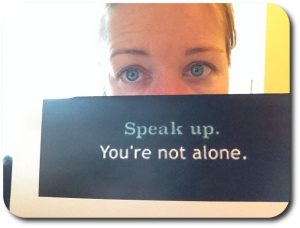This morning i woke up remembering her black eye from 45 years ago. The memory still haunts me. We were hippies then; she had invited my friend Bernard and me to stay overnight in her boyfriend’s barn. He was a hippie too; he made jewellery for a living, and we thought he was a cool guy. Being a hippie back then was all about peace and love and nonviolence.
The next morning, she came to the barn and apologised, pleaded with us under tears to leave quickly, turning her face with the black eye away as much as possible. He had hit her, punched her in the face because she hadn’t asked his permission to let us stay. This was my first encounter with domestic violence.
Her injury, her hurt, her humiliation, her shame playing across her face and her body and breaking her voice is a distant memory that still delivers a blow to the stomach. I see it, hear it and feel it now, in this moment, as I write this.
We felt driven to give him a taste of his own medicine. The impulse to be violent easily comes up in the face of helplessness, and we did not reflect that it would be more of the same. Our outrage, our anger, our wish to beat him for what he had done frightened her further, and she begged us again to leave with even more urgency.
All these many years later that shocking incident still remains unresolved within me. I do not know where she is or how she is living today; I cannot even remember her name, but I remain painfully aware of her troubles.
 Not being able to help in the face of abuse can be agonising, and many others around families where there is violence or other kinds of harmful behaviour have similar feelings. Many parents we work with in NVR are initially reluctant to involve others around the family – their own relatives, members of the community, teachers in their children’s school – in the affairs of the family. Trauma has an isolating effect, and they may have lost their inner awareness of (potentially) supportive others; their shame can feel overwhelming; they may worry that the others will see them as victims, they may fear blame, they may not want to burden the other.
Not being able to help in the face of abuse can be agonising, and many others around families where there is violence or other kinds of harmful behaviour have similar feelings. Many parents we work with in NVR are initially reluctant to involve others around the family – their own relatives, members of the community, teachers in their children’s school – in the affairs of the family. Trauma has an isolating effect, and they may have lost their inner awareness of (potentially) supportive others; their shame can feel overwhelming; they may worry that the others will see them as victims, they may fear blame, they may not want to burden the other.
But let’s look at the situation from the perspective of ‘the other’: There may be a reluctance on the part of some to hear a vivid self-account of violence and abuse a parent is suffering, or to learn about the full extent of a young person’s self-destructive behaviour. Such reluctance can increase with the witness’ growing sense of helplessness, if they have no vision of how they might be able to contribute to bringing about change for the family.
 The result of this process can be ‘compassion fatigue’, and others around the family will be likely to withdraw, if they hear about abuse and find their hands are tied. However, to learn what I may be able to do in the face of the parent’s struggle – and the difficulties of the child who is acting abusively – can be merciful. When the NVR practitioner puts the parent’s needs for support in the centre of the dialogue, a supporter can become engaged in a way that spells relief from their own helplessness. Many supporters share how they feel privileged to have been invited to help, how glad they are that things are finally moving forward for the family, that they urgently want to be part of this process.
The result of this process can be ‘compassion fatigue’, and others around the family will be likely to withdraw, if they hear about abuse and find their hands are tied. However, to learn what I may be able to do in the face of the parent’s struggle – and the difficulties of the child who is acting abusively – can be merciful. When the NVR practitioner puts the parent’s needs for support in the centre of the dialogue, a supporter can become engaged in a way that spells relief from their own helplessness. Many supporters share how they feel privileged to have been invited to help, how glad they are that things are finally moving forward for the family, that they urgently want to be part of this process.
I could not then and cannot now do anything for the young woman of so many years ago, but I can ‘help forward’, by giving others in the ecological environment of the family the opportunity to become supporters, and meet their own, deeply felt need to have agency in bringing about change.
By Dr. Peter Jakob
 Consultant Clinical Psychologist & Systemic Family Therapist
Consultant Clinical Psychologist & Systemic Family Therapist
Director PartnershipProjects
NVR is a highly effective, innovative systemic approach to the violent, harmful and self-destructive behaviour in young people. NVR is ideally suited for working within Social Services and Education environments. More here…
